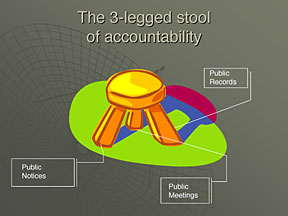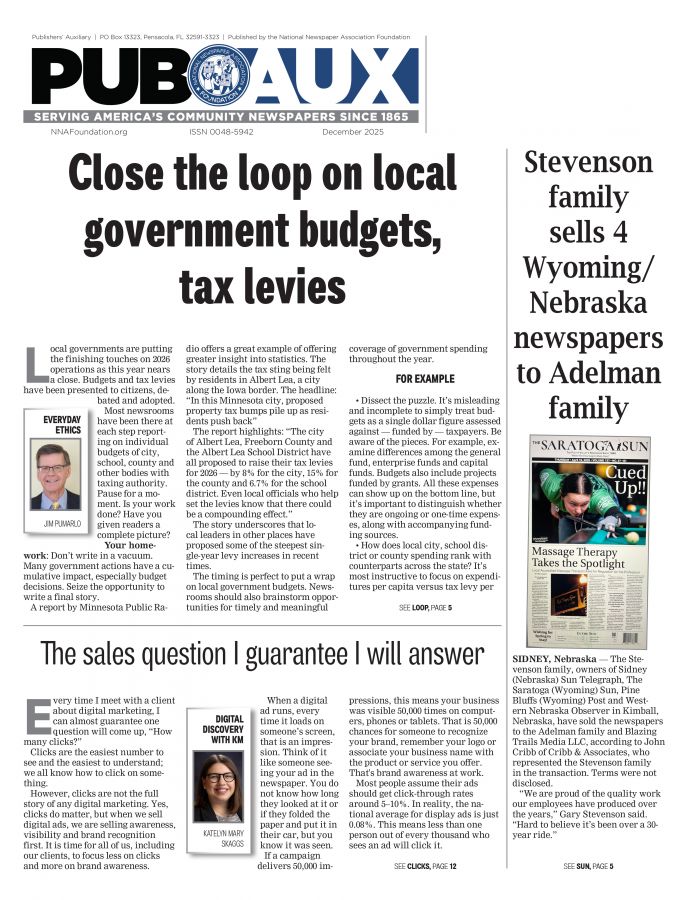Move to government websites picks up steam in Ohio
Public Notice Resource Center & NNA
Dec 1, 2023



Townships in Ohio are seeking the same power already granted to municipalities in the state: the power to publish notice via the internet instead of a local newspaper.
Introduced late last week, a new bill, HB-315 (https://bit.ly/47w0eVI), would expand townships’ public notice options beyond print, allowing them to post notice on their own websites and social media accounts, or on the Ohio News Media Association’s statewide public notice site. It adopts the same language as HB-33 (https://bit.ly/40IJsR3), legislation enacted this summer authorizing cities and villages — “municipalities” under Ohio law — to publish notice online. HB-315 duplicates HB-33’s statewide website option, even though ONMA announced after the latter bill passed that without major upgrades, the website isn’t capable of accepting ads directly from customers.
Unlike the earlier bill, however, which was inserted at the last minute into the state’s annual spending bill and leaves its drafters’ intentions somewhat vague, HB-315 is clearly designed to empower the state’s 1,000+ townships to completely abandon print. It includes dozens of separate amendments targeting specific notices, including notices pertaining to bids, resolutions, hearings, regulations, reports, assessments, cemeteries, road improvements and property sales, as well as those designed to provide constructive notice for individuals whose address is unknown.
The entire state of Ohio is governed by townships, except for those that share borders with a city or village, according to Wikipedia (https://bit.ly/46iHB6N). If HB-315 passes, newspaper notice will still be required in Ohio only at the county and state levels of government.
At least one municipality moved quickly after HB-33 took effect to begin the process of removing notices from its official newspaper. Last month, the city of Mount Vernon introduced an ordinance amending the public notice provisions of 15 local laws relating primarily to government meetings and hearings, environmental regulations and zoning applications.
The ordinance must be read at two more city council meetings before it can be approved by the central Ohio city’s governing body.
The Mount Vernon News appears to imply in its reporting that the city’s plan to stop using it to publish the municipality’s official notice was intended as retaliation for the paper’s “reporting on the city’s move to make Mount Vernon ‘carbon neutral.’” The paper also reports the city paid it $15,200 to publish notices “in the last three months alone.”
The Mount Vernon News was sold in 2020 by a local family that had owned the paper for 80 years, according to The Columbus Dispatch (https://bit.ly/3G4mYAq). It was sold to Metric Media LLC, a Chicago-based company that owns a “conglomerate of pay-to-play Republican news sites,” reports the Dispatch. Metric Media says on its website that it operates over 1,300 “community news sites,” including more than 50 based in Ohio (https://bit.ly/40IJFDP). It also publishes an unknown number of local newspapers, like the one in Mount Vernon, according to the New York Times (https://bit.ly/3R1AKtZ).
The Ohio News Media Association last month emailed its members with an update on HB-33. “We are still engaged in active conversation with the Ohio Municipal League about some aspects of the statute that we would like to see revised,” said ONMA President and Executive Director Monica Nieporte. “Because the municipal notice change was included in the budget bill for the entire state, it is not realistic to expect the legislature to repeal this entire bill. Instead, we are working to have this issue addressed separately.”
Issued before the bill targeting townships had been introduced, Nieporte’s message also stated that “it is our belief, after conversation with some key parties, that the intention behind the changes (in HB-33) was to provide an alternative for very small municipalities with very limited funds (but) the way the language was drafted opened the door for everyone.” She recommended ONMA members hold their municipalities accountable and encourage readers to do the same.
ONMA’s communication also included a “confidential” legal analysis of HB-33 (https://bit.ly/3ujwAVw) prepared by the press group’s lobbying firm.
SOME CITIES OPT OUT OF NEWSPAPER NOTICE IN KANSAS
Kansas Attorney General Kris Kobach recently issued a legal opinion declaring that some cities may publish notices on their own websites, despite a state law requiring them to be published in local newspapers.
“Home-rule provisions of the Kansas Constitution … allows cities to exempt themselves from nonuniform acts of the Legislature,” Kobach wrote. “We conclude that a second-class city may exempt itself by charter ordinance. And, once having done so, may then choose to publish official city business on its own webpage.”
Municipalities with populations between 2,000 and 15,000 people are considered “cities of the second class” in Kansas.
Kobach issued the nonbinding opinion at the request of state House member Stephen Owens, R-Hesston. According to Kansas Press Association Executive Director Emily Bradbury, “Rep. Owens was frustrated he couldn’t get a law passed allowing cities to move their notices out of newspapers, so he’s looking for a new strategy.” Owens introduced bills in the last two legislative sessions that would have made newspaper notice optional, says Bradbury. Neither got a hearing.
Nevertheless, KPA agrees with the attorney general that Kansas’ home-rule provisions allow cities to opt out of the state’s public notice laws by passing a charter ordinance. KPA has urged its members to meet the threat head-on by working to bring the issue before local voters in a special election. The association issued a toolkit to help them do that.
“There’s a huge transparency issue here,” Bradbury told some of her members in a Sept. 28 meeting covered by nonprofit news website Kansas Reflector (https://bit.ly/47DletG). “No matter what (population) class you are in, you need to watch this. It’s spreading. Don’t sleep on this.”
Publisher Chris Strunk began executing the KPA playbook after the city council in Bel Aire voted earlier this year to move the municipality’s notices from his weekly — Ark Valley News, where they had been published for 17 years — to the City of Bel Aire website. He collected and certified the signatures necessary to authorize a special election, and on Oct. 19, he filed the petition with the city clerk. The process mandated by the state constitution requires the city to hold the election within 90 days of that filing or in conjunction with its next regularly scheduled election in August 2024. It also has the option to rescind the ordinance and continue to publish its notices in the Ark Valley News. The city council plans to vote on the matter at its next meeting, which is scheduled to be held today.
Strunk told us he didn’t know what to expect when he set up a table in a park near City Hall to collect signatures, and he was surprised and gratified by the support his paper received from the community. Several readers of the Ark Valley News and its sister publication, the free monthly Bel Aire Breeze (https://bit.ly/3SJsPmc), were so fired up about the issue they volunteered to collect signatures on their own. Strunk says about 60% of the signatures required under the constitution were ultimately gathered by those volunteers.
“When you talk to readers, they tell you they want government accountability, and they believe the publication process is part of that accountability,” says Strunk. “It was an amazing experience to feel that kinship with readers. They feel the same obligation we feel in terms of holding the government accountable.”
Bradbury says several other cities have also approved charter ordinances to allow them to publish notices on their own websites, including Hays (https://bit.ly/3ukKDdv), Dodge City, Hillsboro and Hesston, which Rep. Owens represents. She says Kansas Publishing Venture owner Joey Young recently learned his effort to bring the issue to a vote in Hesston has succeeded and that the Marion County Record is leading the charge to do the same in Hillsboro. (The Record made national news (https://bit.ly/3R3DyqG) this summer when its office was raided by local police.)
Along with Wisconsin and Wyoming, Kansas is one of at least three states to grant home-rule powers to municipalities via a charter ordinance form of government, according to Ballotpedia (https://bit.ly/47buhlQ). As PNRC reported in September (https://bit.ly/3ugGI1k), Lee Enterprise’s Casper Star-Tribune filed a lawsuit seeking to prevent two municipalities in Wyoming from adopting ordinances allowing them to opt-out of state laws mandating newspaper notice. The district court hearing the case stayed the proceedings to allow the two municipalities to revise the ordinances that are the subject of the lawsuit. That process appears to be nearing its conclusion, reports the Oil City News (https://bit.ly/3sz14lV).
Counties and municipalities in other states have sought to carve out exceptions to public notice laws allowing them to circumvent newspaper-notice requirements; however, in states without a home-rule tradition local governments must seek the approval of the state legislature to obtain such an exemption.
CONNECTICUT SUPREME COURT TO HEAR PUBLIC NOTICE CASE
In 2019, the tiny Connecticut borough of Fenwick amended its zoning regulations to limit Airbnb-type temporary rentals of local homes. Two property owners in Fenwick opposed the new regulation, so they sued to stop it, arguing the local zoning commission violated the state’s statutory notice requirements.
Even though Fenwick published timely, substantively sufficient notice in a local newspaper it had used for decades for that purpose, the trial court found the notice didn’t comply with the state’s public notice law and granted the property owners’ motion for summary judgment.
The decision was upheld by an appellate court earlier this year (https://bit.ly/3ubG0SM). The Connecticut Supreme Court agreed to hear Fenwick’s appeal of the ruling.
Connecticut’s general public notice statute (https://bit.ly/3G4GRaO) requires a newspaper to have “substantial circulation” in a town to qualify to publish notice there. The trial court found that The Middletown Press, a Hearst newspaper based about 30 miles outside of Fenwick, didn’t meet that standard because it had no subscribers among the 83 households in the seaside borough, which serves as a summer home for most of its residents.
The court said the defendant failed to provide evidence that may have buttressed its case. For instance, the president and publisher of Hearst’s Connecticut Media Group testified there are nine locations in neighboring Old Saybrook where single copies of the Press are sold, but Fenwick was silent about whether any of those sales were made to its residents. The court also noted the borough failed to present any evidence of the paper’s online traffic data, even though the Press publishes notices on its website.
Moreover, the appellate court noted that although it wasn’t relevant to its decision, an exhibit filed by the plaintiffs indicated that a different paper publishing in the same area had 16 subscribers in Fenwick.
Now that the case will be heard by the Supreme Court, several associations representing government officials in Connecticut want to drive a truck through the narrow issues presented by this unprecedented set of facts (https://bit.ly/40Ew4NZ). They filed amicus briefs hoping to achieve by judicial fiat what they have repeatedly failed to convince state legislators to do: allow them to post notice on the internet instead of local newspapers. The Connecticut Conference of Municipalities even urged the court (https://bit.ly/40LslxZ) to allow its members to post notices on their own websites in lieu of newspaper publication.
The Connecticut Daily Newspaper Association didn’t file an amicus. CDNA Executive Director Chris VanDeHoef told the Waterbury, Connecticut–based Republican-American (https://bit.ly/3unvcRS), “We’re certainly monitoring the case … but resources are not there to file a brief at the Supreme Court level.”
A date for oral arguments hasn’t been set.










